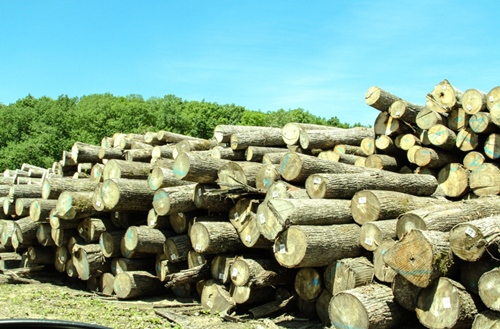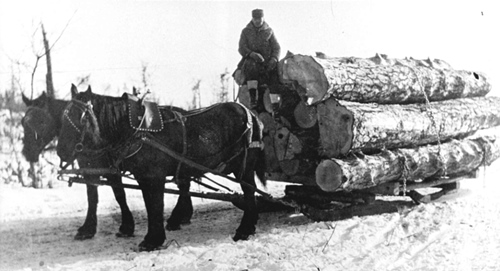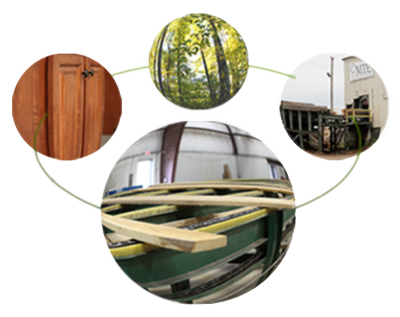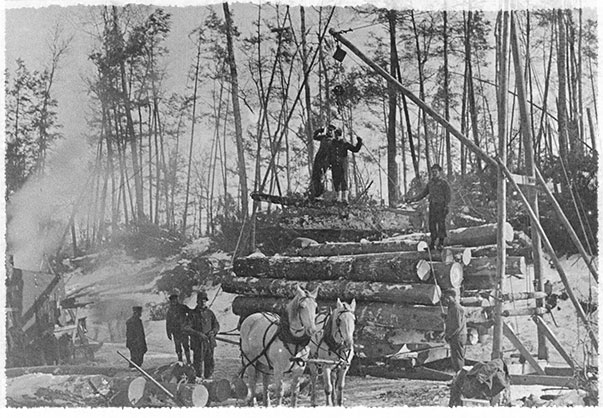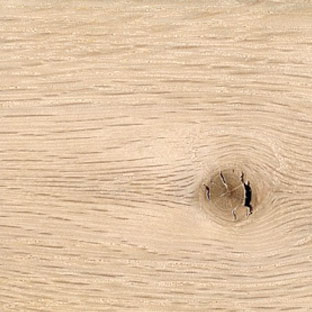-
1854 to Present
The Menominee Tribe has inhabited Northeast Wisconsin and Michigan's Upper Peninsula for generations, where ancestral tribal lands encompassed over 10 million acres. Following several treaties and land cessions, in 1854 the Menominee people were confined to their current Reservation lands, totaling 235,000 acres. The Treaty of May 12, 1854 established the Menominee Reservation. Initially, the small Keshena Falls sawmill manufactured lumber, shingles and other products primarily to supply the needs of the reservation.
Between the beginnings of the saw mill in 1871 and 1890, approximately 100 million board feet of logs were cut for sale from dead and downed timber.
1890
June 12, 1890 – Congressional Act (26 Stat. 146) is signed into legislation
Congress Recognizes Sustained-Yield Management
The Congressional Act (26 Stat. 146) of June 12, 1890, allowed the cutting of standing green timber and established the annual allowable cut on Menominee at 20 million board feet. This Act was a legislative landmark, as it recognized the need to limit indiscriminate cutting that would deplete the forest resource and eventually deprive the Menominee of their economic livelihood. The Act marked one of Congress’ first attempts to prescribe sustained-yield management on federally controlled lands, recognizing the nation’s shift toward a conservation land ethic. The harvest of Menominee timber continued under this legislation from 1890 to 1907.
1908
March 28, 1908 – Congressional Act (Pub. L. 74-60) (35 State. 51) signed into legislation
Neopit Sawmill Construction Authorized
The backbone of the Tribal economy has been its forest product industry. The Tribal Enterprise has its origins back in 1908, when the saw mill was built in Neopit. The Congressional Act (Pub. L. 74-60) (35 State. 51) of March 28, 1908 authorized the salvage of the downed timber and construction of the Neopit sawmill to maximize economic benefit to the Tribal members. More important, it further strengthened the sustained-yield concepts contained in the Act of 1890, by adding language such as “the protection, preservation, and harvest of the forest upon the Reservation.” It also strengthened harvesting practices established in the Act of 1890.
1934
June 18, 1934 – Indian Reorganization Act signed into law
Government Direction Implemented over Indian Forestry
The Indian Reorganization Act of June 18, 1934, established Secretarial trust responsibility on the Menomonee Forest accordingly: “The Secretary of the Interior is directed to make rules and regulations for the operation and management of Indian forestry units on the principle of sustained-yield management…” The Secretary defined sustained-yield under 25 CFR, Part 163, Section 163.1 as “…the yield of forest products that a forest can produce continuously at a given intensity of management.”
While under Section 163.4, sustained-yield management requires”… practical methods of harvest, based on sound economic, silvicultural and other forest management principles… Harvest schedules shall be directed toward achieving an approximate balance at the earliest practical time, between maximum net growth and harvest…” The Act restored management of assets to the Native Americans of the land.
1954
June 17, 1954 – The Menominee Termination Act signed
Federal Tribal Recognition Removed
The Menominee Termination Act of June 17, 1954 “Terminated federal supervision over the property and members of the Menominee Indian Tribe of Wisconsin.” Although the Menominee Termination Act of 1954, removed the Reservation from federal trust protection status, Section 896 of this Act required “The plan shall contain provision for protection of the forest on a sustained-yield basis and for the protection of the water, soil, fish and wildlife.”
Historically, the sustained-yield requirement was intended to ensure that the only significant source of jobs, economic development and tax revenue on Menominee, i.e., the forest and Tribal sawmill, are preserved. This provision of federal law led to State of Wisconsin Chapter 258, Laws of 1959, creating 70.335 of Wisconsin Statutes, Valuation and Assessment of Sustained-Yield forest Lands.
1973-75
December 22, 1973 – Menominee Termination Act repealed, Menominee Restoration reinstated
April 22, 1975 – The Trust and Management Agreement passed
Tribal Sovereignty Reinstated
The Menominee Restoration Act (Pub. L. 93-197) repealed the Termination Act and reinstated The Menominee Indians of Wisconsin as a federally recognized sovereign Indian Tribe. The Act also preserved the rights and privileges outlined in the Indian Reorganization Act of June 18, 1934.
Restoration Plan
This Plan allowed for provisions “That the forest will continue to be operated on a sustained yield basis. The Trust and Management Agreement specifically states this requirement in Section 6, and the Forest will be operated according to the existing Forest Management Plan, Which sets forth detailed procedures for operating the tribal forest on a sustained yield basis.”
Unique Trust Relationships Established between Menominee and Federal Government
In accordance with the Menominee Restoration Act, the Trust and Management Agreement established rights intended to grant “maximum self-determination to the tribe”. The Menominee Tribal Enterprises has been charged with the responsibility of managing the forest, which is held in trust by the Secretary of the Interior for the benefit of the Menominee People.
1976
November 12, 1976 – Constitution and Bylaws of Menominee Indian Tribe of Wisconsin Adopted
Constitutional Framework Established
A living document is introduced and bylaws are laid out for the Menominee Tribe, with enumerated guarantees that the forest would continue to operate on a sustained-yield basis, incorporated from the provision of the Trust and Management Agreement of 1975.
2005
April 2, 2005 – Menominee Tribal Enterprises supplies wood flooring to NCAA Tournament Final Four in St. Louis and Indianapolis
Quality Wood Flooring Tradition Continued
MTE, in conjunction with Horner Flooring of Dollar Bay Michigan, produced the NCAA basketball tournament’s final floor. MTE had been supplying wood for the NCAA basketball floors since 1985.
2012
April 1, 2012 – CBS Sports Documentary “Court of Champions” debut, featuring MTE Wood
Wood Flooring for the 2012 NCAA Final Four
The CBS documentary tracks the progress of the NCAA Tournament’s basketball floor for the Final Four from the wood’s origins in the Menominee Forest, Wisconsin all the way to its installation in the Superdome in New Orleans.
2016
April 19, 2016 – MTE and U.S. Department of Agriculture Forest Service Sign Collaboration Agreement
April 20, 2016 – MTE opens new biomass district energy system
Collaboration
The College of Menominee Nation and the U.S. Forest Service will cooperate in synthesizing best practices in forest management, ecology, utilization and Native American expertise and applying this knowledge to sustainable forest practices and sustainable development. The college's Center for First Americans Forestlands will administer the initiative.
New MTE Biomass Facility district energy system Inauguration
MTE’s new biomass high-efficiency energy system will generate roughly 85,000 million Btu of heat and 1 million kilowatt hours of electricity per year to replace aging equipment, improve air quality and reduce operating costs at the facility.
